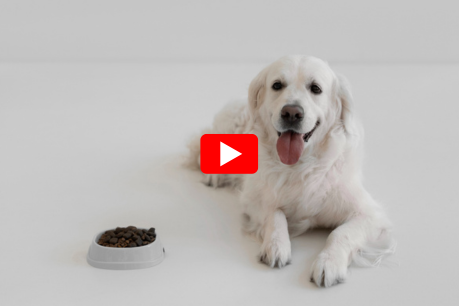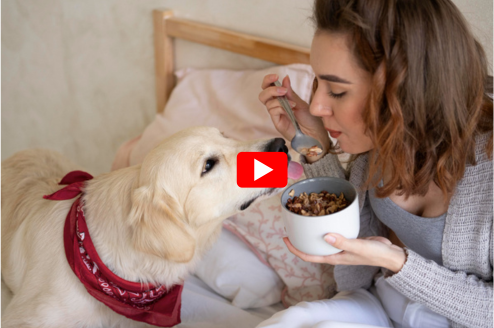Psyllium Husk Dosage for Diarrhea: Safe & Effective Guide
Table of Contents
ToggleDiarrhea in dogs is a common but distressing problem that pet parents encounter more often than they’d like. From dietary indiscretions to stress or sudden changes in environment, your canine companion’s digestive system can be sensitive.
While veterinary care is crucial for severe cases, there are natural, safe options for mild, non-infectious diarrhea episode one of the most trusted being psyllium husk.
For dog diarrhea, give ¼ tsp for small dogs, ½–1 tsp for medium, and up to 2 tsp for large dogs daily, mixed with food and plenty of water.
Suppose you’re wondering about how much psyllium husk to give your dog for diarrhea. In that case, this comprehensive guide will cover everything you need to know from its benefits, safe dosage, and how to administer it effectively to your pet.
What is Psyllium Husk?
Psyllium husk is the outer shell of the seeds from the Plantago ovata plant, primarily grown in India and parts of Asia.
It’s a natural, soluble fiber that absorbs water and transforms into a gel-like substance when mixed with liquids.
This unique ability makes it beneficial for regulating bowel movements — whether dealing with constipation or diarrhea.
In canine health, psyllium is often recommended by veterinarians as a gentle, bulk-forming fiber to support regular stool formation.
Why Is Psyllium Husk Used for Dog Diarrhea?
It might seem unusual to use fiber for diarrhea, but here’s why psyllium husk works so well:
-
Absorbs Excess Liquid: Psyllium can absorb several times its weight in water, helping to solidify loose, watery stools in the digestive tract.
-
Adds Bulk to Stool: The fiber forms a soft, gel-like mass that increases the volume and consistency of feces.
-
Regulates Bowel Transit Time: By increasing stool bulk, psyllium slows the speed at which waste moves through the intestines, giving the body more time to reabsorb water.
-
Soothes the Colon: The gel-like coating produced by psyllium can help reduce inflammation and irritation along the intestinal walls.
This dual ability to treat both constipation and diarrhea makes psyllium husk a valuable tool in canine digestive health.
Causes of Diarrhea in Dogs
Before using psyllium, it’s important to understand what might be causing your dog’s diarrhea. Common causes include:
-
Dietary indiscretion (eating garbage or spoiled food)
-
Sudden changes in diet
-
Food intolerance or allergies
-
Stress and anxiety
-
Intestinal parasites
-
Bacterial or viral infections
-
Medication side effects
-
Underlying health conditions like inflammatory bowel disease (IBD)
While mild diarrhea can often be managed at home with fiber and bland foods, persistent or severe symptoms require veterinary care.
How Does Psyllium Husk Help Manage Diarrhea in Dogs?
When a dog experiences diarrhea, its stools are loose, watery, and frequent. This leads to dehydration, loss of nutrients, and electrolyte imbalances. Here’s how psyllium husk steps in to help:
-
Absorbs water from intestinal contents
-
Adds volume and bulk to loose stools
-
Slows down intestinal transit
-
Encourages normal peristalsis (wave-like muscle contractions of the intestines)
-
Supports the gut microbiome by acting as a prebiotic fiber
As a result, stools become more formed, the frequency of defecation decreases, and the digestive tract gets a chance to stabilize.
Psyllium Husk Dosage for Dogs with Diarrhea
The correct psyllium husk dosage for dogs with diarrhea depends on the dog’s weight. Too much can cause bloating or constipation, while too little may not be effective.
Here’s a helpful guideline:
📍 General Psyllium Husk Dosage by Dog Weight
| Dog’s Weight | Psyllium Husk Dosage (per meal) |
|---|---|
| Under 10 lbs (4.5 kg) | ¼ teaspoon |
| 10–30 lbs (4.5–13.6 kg) | ½ teaspoon |
| 30–50 lbs (13.6–22.7 kg) | 1 teaspoon |
| Over 50 lbs (22.7 kg+) | 1½ to 2 teaspoons |
How to Give Psyllium Husk to Dogs
Psyllium husk is relatively tasteless and easy to mix into your dog’s food. Here’s how you can safely administer it:
📍Step-by-Step Instructions:
-
Measure the appropriate dose based on your dog’s weight.
-
Mix the psyllium husk with your dog’s wet food or moistened kibble.
-
Add a small amount of water to ensure it mixes well and doesn’t dry out.
-
Serve immediately, as psyllium thickens quickly when mixed with liquid.
-
Ensure your dog has fresh water available at all times.
How Long Does It Take to Work?
In most cases, you can expect to see improvements in your dog’s stool consistency within 12–24 hours of the first dose. For optimal results, continue for 2–3 days or until the diarrhea resolves.
If no improvement is seen within 48 hours, or if symptoms worsen, consult your veterinarian.
When Not to Use Psyllium Husk for Dog Diarrhea
There are scenarios when psyllium husk should not be the first line of treatment:
-
If your dog is experiencing bloody diarrhea
-
If diarrhea is accompanied by vomiting, fever, or lethargy
-
If the diarrhea persists for more than 48 hours
-
In cases of intestinal blockages or swallowing difficulties
Always seek veterinary attention in these situations.
Natural Home Care Tips for Diarrhea in Dogs
Along with psyllium husk, these supportive measures can help:
-
Feed a bland diet: Boiled chicken and plain white rice or pumpkin puree
-
Keep your dog hydrated: Encourage small, frequent sips of water
-
Rest: Limit physical activity until the diarrhea subsides
-
Gradually reintroduce regular food over 3–5 days
Can You Give Psyllium Husk to Puppies?
Yes — with caution. Puppies can be given psyllium husk for mild diarrhea, but it’s essential to:
-
Use half the adult dosage
-
Ensure plenty of water intake
-
Consult a vet for diarrhea lasting beyond 24 hours
Because puppies dehydrate quickly, early veterinary consultation is recommended.
Conlusion
Psyllium husk is a simple, natural, and effective remedy for mild to moderate diarrhea in dogs. Its ability to absorb excess moisture and bulk up stools makes it a reliable home management tool.
When used appropriately based on your dog’s weight, with ample water, it can safely restore normal bowel movements within a day or two.
However, it’s crucial to recognize when diarrhea is a symptom of a more serious issue. If your dog shows additional signs of illness, prolonged symptoms, or bloody stools veterinary care is non-negotiable.
By combining proper psyllium husk dosage with hydration and a bland diet, most cases of uncomplicated doggy diarrhea can be managed comfortably at home.
References Link
- Psyllium and Digestive Health Effects in Animals
https://www.ncbi.nlm.nih.gov/pmc/articles/PMC6019702/
- General Information on Psyllium and Plantago Ovata
https://en.wikipedia.org/wiki/Psyllium
- Digestive System Overview in Dogs
https://www.merckvetmanual.com/dog-owners/digestive-disorders-of-dogs



